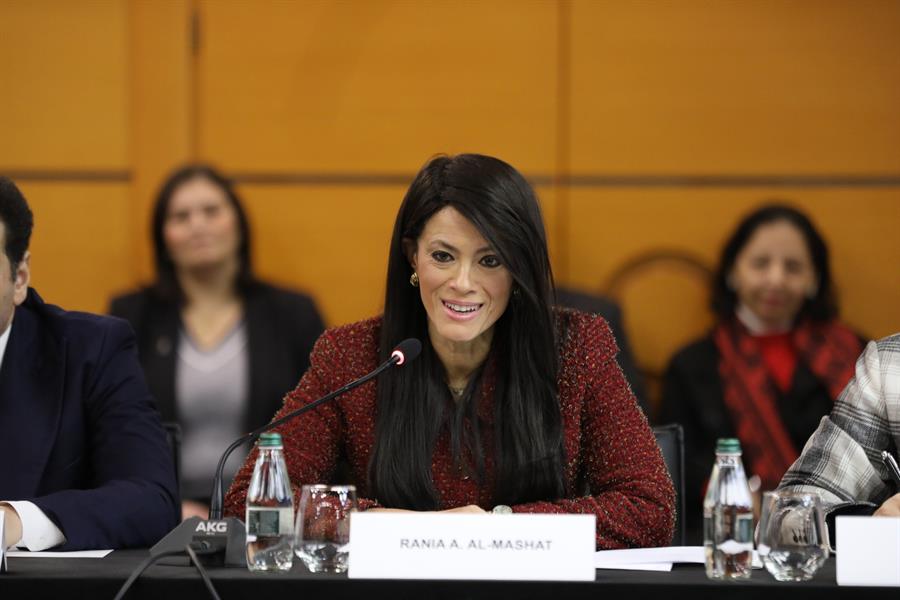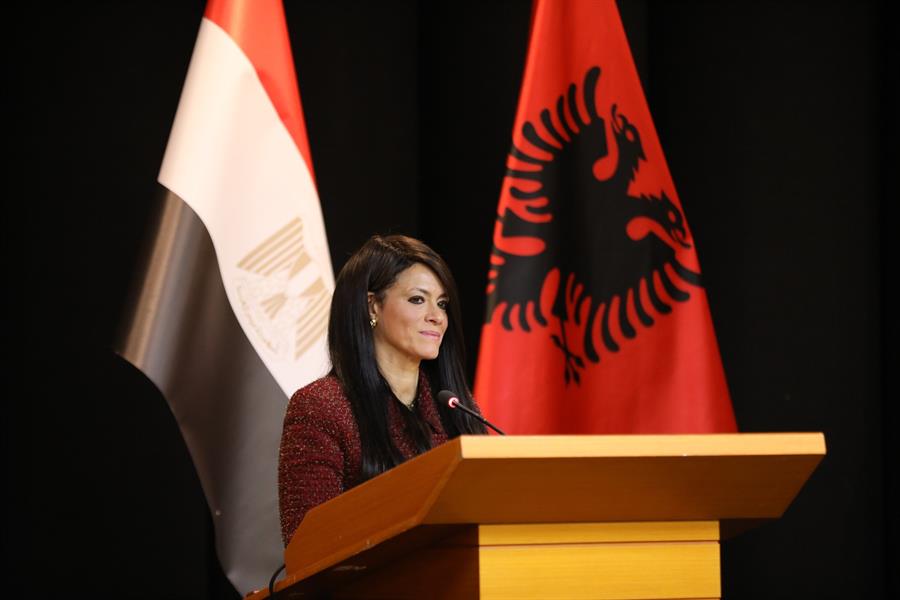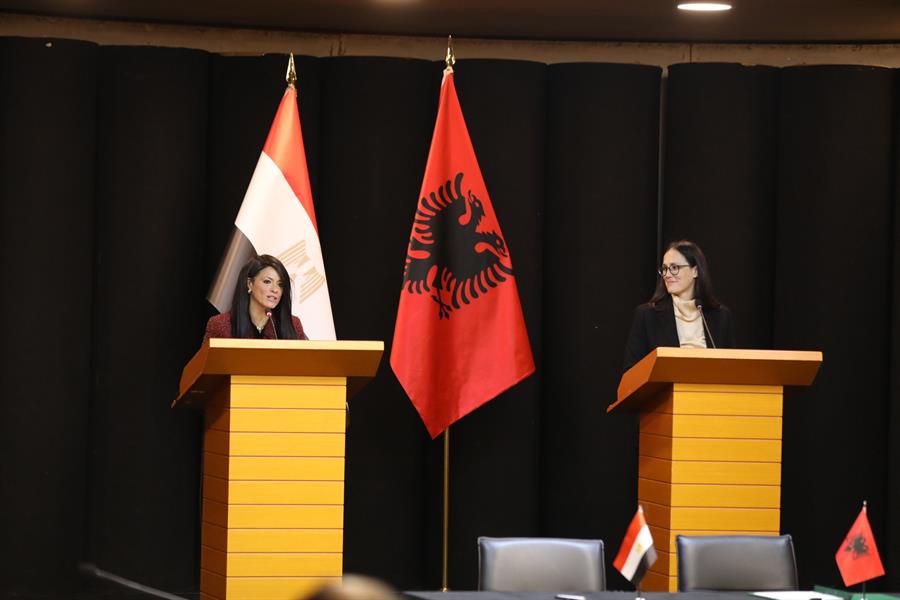Egypt Demonstrates Commitment to Sustainable Development: Ambassador Hisham Badr Highlights Vision 2030 Initiatives at Luxor Conference

19 January 2024
Ambassador Hisham Badr, representing H.E.Dr. Hala El Said, Minister of Planning and Economic Development, participated in the fourth annual conference on sustainable development in Luxor under the theme "Sustainable Development in a Changing World: Paths Towards a Sustainable Future." The conference, organized by the Orman Association in collaboration with the Egyptian Industries Federation, included the participation of Dr. Heba Maguib, Head of the Regional Planning Sector at the Ministry.
In his speech, Ambassador Hisham Badr emphasized Egypt's commitment to comprehensive and sustainable development despite unprecedented geopolitical challenges worldwide. He highlighted the implementation of Egypt's Vision 2030 and the National Program for Structural Reforms, aiming to transform the Egyptian economy into a knowledge-based and globally competitive one, fostering inclusive growth, creating productive job opportunities, diversifying production patterns, and enhancing the competitiveness of Egyptian exports.
Badr stressed the facilitation and development of trade, creating a supportive environment for competition, and organizing developmental partnerships with the private sector. He highlighted the Sovereign Fund for Investment and Development and the implementation of the "State Ownership Policy," clarifying the state's role as an economic activity regulator and promoting active private sector participation in achieving comprehensive and sustainable development.
Badr mentioned Egypt's efforts in launching initiatives that maximize contributions from various sectors towards sustainable development. Notably, he highlighted the "Decent Life" presidential initiative, one of the world's largest developmental initiatives, covering around 60% of Egypt's population and addressing all Sustainable Development Goals. This initiative reflects successful collaboration between the government, private sector, and civil society.
Ambassador Hisham Badr also discussed the Egypt Government Excellence Award, demonstrating the government's focus on involving the private sector in its developmental efforts. He highlighted the expansion of the award to promote a culture of excellence and positive competition among all state sectors.
Furthermore, Badr touched upon the "National Initiative for Smart Green Projects," showcasing collaborative efforts across sectors for sustainable development. The initiative encourages innovation to address climate change challenges and aims to transition Egypt to a green economy. Over two consecutive rounds, it received approximately 12,000 projects, with 36 national winners representing Egypt in the United Nations Climate Change Conferences.
Ambassador Hisham Badr, in his speech on behalf of Dr. Hala El Said, Minister of Planning and Economic Development, explained that the Egyptian government is taking all measures to achieve comprehensive and equitable development, adhering to the principle of "leaving no one behind." The Ministry of Planning actively provides voluntary reports at both local and national levels to the international community, ensuring intensified development efforts in regions and sectors most in need. Badr emphasized the preparation of voluntary national reports tracking progress towards the seventeen Sustainable Development Goals across the Republic.
Additionally, he highlighted the Ministry's support for three Egyptian provinces—Port Said, El Beheira, and Fayoum—in launching their local voluntary reports. This underscores Egypt's commitment to localizing sustainable development goals, contributing to inclusive and sustainable growth. Badr clarified that these reports are considered "state reports," not just governmental ones, prepared through a participatory approach that integrates all segments of society.
Ambassador Hisham Badr then discussed the launch of Egypt's first electronic platform for managing corporate social responsibility and civil society efforts, titled "Partnerships for Sustainable Development." The platform aims to effectively monitor and document all development efforts at both local and national levels, ensuring the inclusion of all national efforts in international reports on Egypt's development status. The coordination between national and local development plans and projects maximizes societal benefits.
Badr stressed the significance of corporate social responsibility (CSR) as a reflection of the commitment to the environment and society, showing positive interactions between various sectors for comprehensive development and improving citizens' quality of life. He mentioned the establishment of the National Committee for Corporate Social Responsibility, consisting of representatives from the business community, government entities, and civil society, to formulate a national CSR strategy in Egypt. This strategy aims to enhance the impact of CSR and direct it towards the most needy areas to reduce development gaps. The Ministry collaborates with various entities to encourage companies to integrate CSR into their strategies.
Badr further addressed the role of the committee responsible for developing and implementing the CSR strategy, emphasizing its tasks, including assessing the current situation, identifying challenges, and preparing the national CSR strategy as an integrated regulatory framework for CSR governance in Egypt. The strategy encourages companies to fulfill their social responsibility and ensures the sustainability and diversification of funding sources for state development projects. Additionally, Badr highlighted the establishment of a database for tracking annual developmental projects carried out by civil society institutions and the private sector within CSR, aligning them with Sustainable Development Goals. The government also plans to introduce incentives to encourage companies to participate more in CSR and to review the legislative framework for corporate social responsibility.
Ambassador Hisham Badr concluded his speech on behalf of Dr. Hala El Said, Minister of Planning and Economic Development, by emphasizing that cooperation and collective efforts between all government entities, civil society organizations, and academic circles are crucial for achieving sustainable development. He underscored the shared responsibility across all sectors of Egyptian society, acknowledging the vital role played by the private sector in contributing to the improvement of communities through CSR initiatives.









